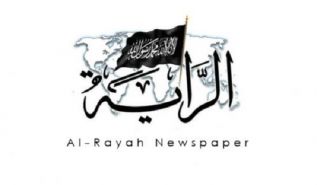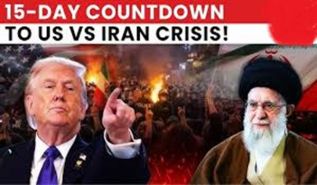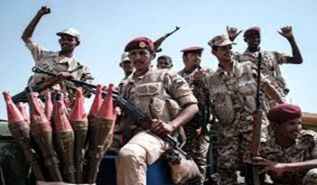بسم الله الرحمن الرحيم
Strategic Defense Agreement Between Pakistan and Saudi Arabia
(Translated)
Al-Rayah Newspaper - Issue 567 - 01/10/2025 CE
By: Ustath Bilal Al-Muhajir – Wilayah Pakistan
The Saudi capital Riyadh witnessed on Wednesday 17 September the signing of the Joint Strategic Defense agreement between Crown Prince Mohammed bin Salman and Pakistani Prime Minister, Shehbaz Sharif, a step described in the media as a qualitative shift in bilateral relations between the two countries. According to the Saudi Press Agency (SPA), the agreement aims to enhance military and security cooperation between Riyadh and Islamabad, including training, exchange of expertise, and coordination on defense matters.
The agreement states that any aggression against one party is to be considered an aggression against both. Despite the clear wording, questions have arisen over whether this implicitly means the extension of Pakistan’s “nuclear umbrella” to protect Saudi Arabia, especially after conflicting statements from Pakistani officials, and unofficial remarks from Saudi sources suggesting that this may be possible. The agreement also includes familiar practical elements such as joint exercises, intelligence sharing, cooperation in defense manufacturing, and training—activities that already existed between the two countries and are now formally codified in a security charter.
The announcement of this alliance came after the abject failure of the Arab League summit and the Organization of Islamic Cooperation (OIC) to respond to the aggression by the Jewish state against Doha, and after its assassination of some leaders of Hamas. The agreement was exploited in the media to divert attention from the betrayal of rulers of Arabs and Muslims toward the Muslims in Gaza and from the massacres being committed there by the Jewish state, and to cover up the disappointment and widespread criticism in the public sphere across the Muslim World. The agreement clearly neglects the issue of Gaza and its support, highlighting the difference between protecting regimes and agent entities from “unknown threats,” and the Shariah obligation that calls for unifying Muslim armies to liberate Muslim lands under occupation.
It also appears that Washington was aware of, or an implicit partner, in the agreement. It is clear that the leaderships of Saudi Arabia and Pakistan sought guidance, or a green light, from America before concluding the security charter. Both regimes are agents of America and do not take strategic initiatives without its approval. The newspaper, Asharq Al-Awsat, reported that Saudi Defense Minister, Khalid bin Salman bin Abdulaziz, held talks in Riyadh on Tuesday 16 September with the commander of U.S. Central Command (CENTCOM), Admiral Brad Cooper, just one day before the charter was announced, on Wednesday 17 September 2025.
This agreement is consistent with, and fits into, America’s plan for a “new Middle East” that it seeks to establish under its control and hegemony. Undoubtedly, an agreement like this between two of its agent states enables America to protect those regimes from the challenges they face in the region, especially the challenge posed by their own peoples, who are mobilizing to overthrow them and to usher in the dawn of Islam, and the establishment of the Khilafah (Caliphate) on the Method of Prophethood across the region. In addition, it allows America to use such alliances against its rivals China, Russia, and Europe. The rapprochement between these two pivotal Muslim countries means imposing their leadership on the rest of the Muslim World to realize America’s vision for the region. Chief among the dimensions of the American vision is joining what America calls the “Abrahamic Accords,” led by America’s regional ally, the Jewish state.
Although the mouthpieces of the Saudi and Pakistani regimes celebrated the security agreement and presented it as a victory and rapprochement between “the only nuclear Islamic country” in the Muslim world and the Custodian of the Two Holy Mosques, a look at the condition of the two regimes clearly shows that they do not seek to tend to the affairs of the Ummah, to champion its causes, or to wage the Ummah’s battles against its enemies, the Jews, Americans, and Hindus. Such aims do not cross the minds of these two regimes, they do not represent neither the lands of the Haramayn, nor of Pakistan, al-Balad at-Tahir (the Pure Land). Both regimes do not rule by Islam. Instead, they fight Islam by joining the crusader alliance that declared, more than two decades ago, a war on Islam under the name “War on Terror.”
Pakistan, the country founded in the name of Islam, is not governed by rulers who rule by Islam, but by a secular regime loyal to America. Since the rule of America’s agent Pervez Musharraf, the regime has worked to secularize the country and its institutions, including the army, paving the way for U.S. intervention in Afghanistan that resulted in the deaths of hundreds of thousands of Muslims. The Pakistani regime still functions as a facilitator for American hegemony in Pakistan and Afghanistan. Worse than the Pakistani regime is the House of Saud regime led by Mohammed bin Salman, especially following the Saudi regime’s open adoption of secularism under what was called “Vision 2030,” which added further loyalty to America, and a war on Islam, imprisoning of ulema, and spread of moral decay in the Haramayn, through the creation of the General Entertainment Authority, which promotes vice and diverts the public away from Islamic values and Shariah rulings.
The Shariah obligation is to achieve unification among all Muslim lands in the Muslim World, not a partial union through agreements like this, or institutions similar to the Arab League. This charter facilitates America’s control of the Saudi and Pakistani regimes, and relieves it of the burden of guarding treacherous regimes in the region from domestic and foreign threats. The chief of the Pakistan Army is thus tasked with protecting Mohammed bin Salman’s crumbling throne from domestic threats, as well as should a Khilafah (Caliphate) arise in the Middle East, or should any external challenge emerge. Such an alliance is not aimed at confronting the Jewish state, which is spreading corruption in the countries of the region, otherwise why has the Pakistan Army not launched some Shaheen missiles, carrying nuclear warheads, at the Jewish state to wipe it off the face of the earth, and cleanse the Blessed Land of Jewish impurity, as the Prophet (saw) gave glad tidings of? Why has the Saudi Army not sent its forces to liberate Palestine instead of sending them to Yemen to bolster American influence there? The answer is clear; treachery, rejection of Islam, and loyalty to America rather than to Allah (swt), His Messenger (saw), and the believers.




